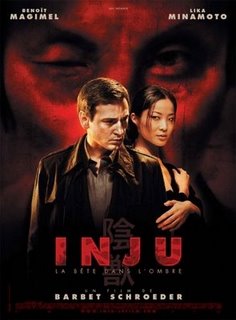
INJU THE BEAST IN THE SHADOW
France, 2008, 105 minutes, Colour.
Benoit Magimel, Lika Minimoto.
Directed by Barbet Schroeder.
Inju the Beast in the Shadow is a murder mystery. It plays with the conventions of the police and murder mystery novel, of the film versions, of audience reactions to reading, to probing mysteries, to responding to films.
The film is highly emotive, rather lush in its presentation of Japan.
The film plays an enjoyable trick on the audience at the opening, giving us a rather sinister and overwrought presentation of a mysterious serial killer and his attacks on geishas. Suddenly we find it is the ending of a film and it is the subject of a lecture in France. Benoit Magimel plays a novelist who is an expert on Japanese murder mysteries, especially a novelist called Oe. When his own novel is published in Japan, he goes on a publicity trip. While on a television program and talkback, he is challenged by the mysterious Oe and his vanity is piqued.
While being hosted in Japan – and the film has a great deal of Japanese life, customs, especially the performances by the geishas, he falls under the spell of a geisha dancer who asks him to solve a mystery.
For those who read murder mysteries, the villain and Oe’s identity might be obvious fairly early – and many audiences have been able to pick the killer. If this is the case, the film is interesting in determining the clues and whether the screenplay was playing fair with the audience in giving indications of who was the killer.
The film is based on a novel by Edogawa Rampo, a novelist in the early part of the 20th century – and it is said that his own character and behaviour were somewhat similar to the behaviour of Oe in this film.
Barbet Schroeder has directed a range of films, beginning in France with dramas then moving to the United States with such films as Barfly, Desperate Measures and the police thriller Murder By Numbers. He also worked in Latin America with Our Lady of the Assassins and directed the very interesting documentary on Jacob Varges, Terror’s Advocate.
1.A film about murder mysteries? Novels? Cinema? Life?
2.The opening, the geisha, the geisha house, the policeman, the geisha’s death, the violence, the killer and his face? Discovering that this was a film? The effect? Alex’s explanation to his class? How films work? Adaptations from novels? Alex as a successful novelist, the Japanese translation, his motivation, his life?
3.Alex and his success, his agent, the preparation for Japan, his acknowledgment of Oe and his novels, his going to the airport, the plane, his reading, his waking up being strangled by the killer?
4.Japan and the contrast with France? Tokyo, its vitality, the buildings, lights? Kyoto and the contrast? The parks? Hotels, streets? Japanese television studios? The geisha tearoom? Homes, offices? Japanese atmosphere? The stylish score?
5.The sections of Japanese culture, traditions, manners?
6.Ken and his meeting Alex, helping him, going to the television station, the interview and his boasting, the phone call from Oe? The reaction? Ken and his meeting the agent Asawe? Getting the documents from the office? Going to the tearoom? His death?
7.Alex and the television, his arrogance, the reaction of Oe, watching him? The smoke? The threats? The increasing number of dreams? Tamao in his dreams?
8.The geisha tradition, the dancing, the tea, the service? Alex fascinated by Tamao? The contact, her confiding in him, the story of her life, an orphan, her parents’ accident, going to the geisha school, her training? The suitor, her refusal, his vengeance? Her showing him the note? Her fear? The sexual response? Alex wanting to help, no matter what the danger? The revelation of her being the killer, sitting in the chair, smoking? Her relationship with the businessman, her pregnancy? The story with the businessman? Asawe, his visiting the prison, his being under her power, helping her and arranging everything? The intruder with the mask sent by Tamao and Asawe?
9.Alex, in himself, his vanity, his believing Tamao, fascinated by her, his investigations, the story, suspicions, identifying Oe, the boss, the manuscript in the desk, his trying to warn him at the plane, in the apartment, the violence? His henchmen? The gun and his shooting the businessman? His continued dreams and suffering?
10.Asawe, the information, the visit to prison, the truth and the taunting?
11.Alex and the businessman, killing him, the court, going to prison, the polite customs for prisoners? His desperation?
12.His being defeated by Tamao, by his own arrogance, by his inability to solve a mystery which he could do in his writings?